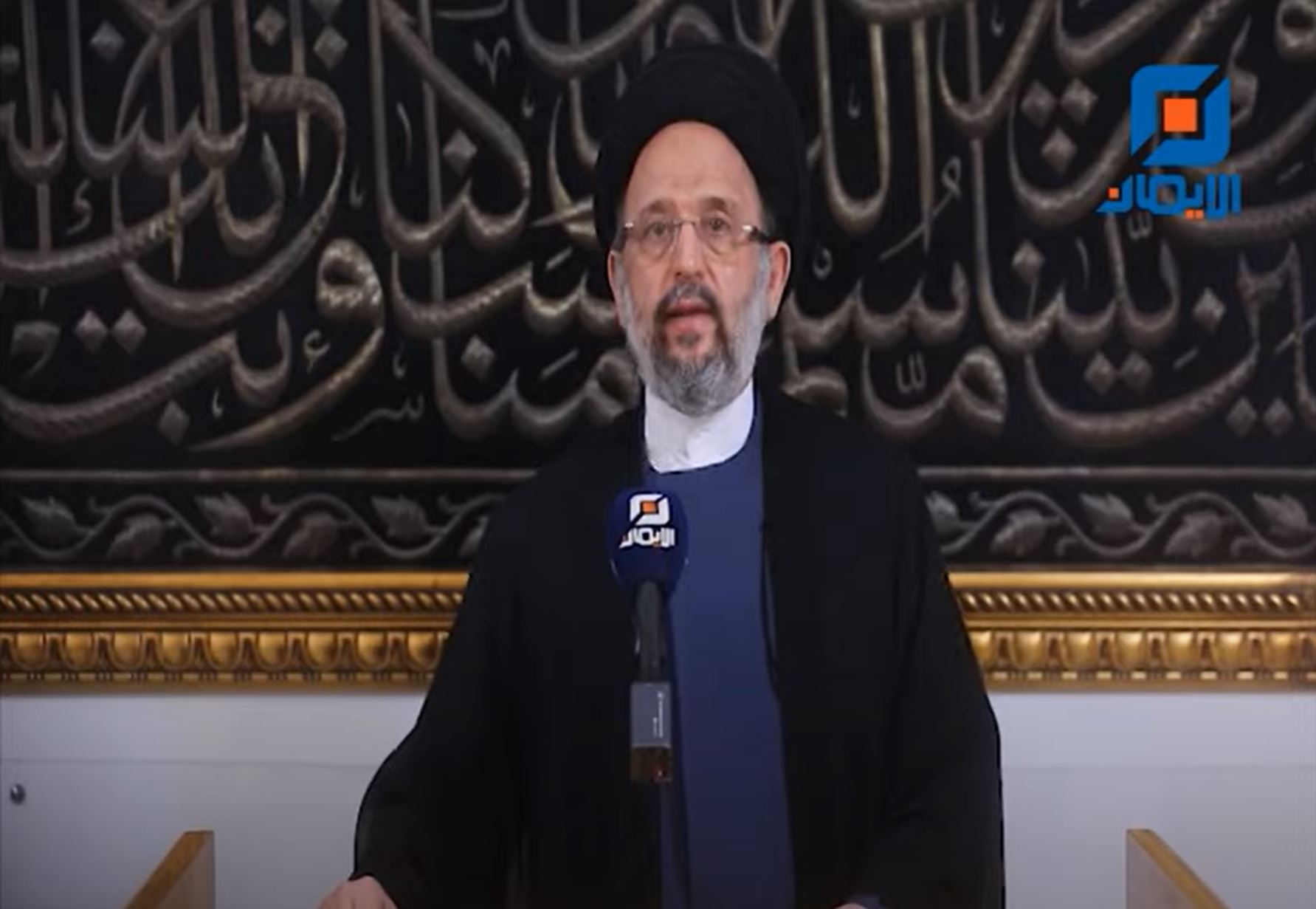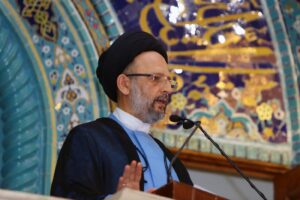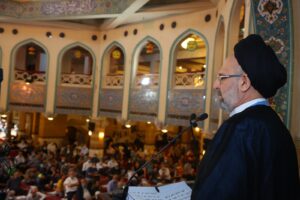Trust in Allah
In The Name of Allah, The Compassionate, The Merciful.
His Eminence, Sayyed Ali Fadlullah, delivered in the context of the Friday Talk, a religious speech on Shaban 10,1441 H. – April 3, 2020 A.D
Following is an edited textof his talk:
“There was certainly in their stories a lesson for those of understanding. Never was the Qur’an a narration invented, but a confirmation of what was before it and a detailed explanation of all things and guidance and mercy for a people who believe”[12; 111].Allah, the Most Exalted says the truth.
Thereare many incidents,in the lives of the prophets, that contain some lessons we ought to learn. In this talk, we are going to focus about three of them:
The first occurred when Allah ordered ProphetIbrahim (a.s.) to bring his wife Hajar and his son Ismail from Palestine to Mecca which was at that time a barrenLand that does not have a source ofwater and that no one lives in. Ibrahim(a.s.) did not hesitate to obey Allah’s command. He left his wife and son in this land with little food and water. Before he left, his wife pleaded to him,saying, “Whom are you leaving us with? We have no one to support us nor do we have food and water.” When Ibrahim(a.s.) told her that they have Allah, she, who was a faithful believer, indicated that God will not let them down.
Ibrahim(a.s.) left Mecca, trusting that God will not leave his wife and child for their fate and that He will take care of them. So, he only prayed to God saying:“Our Lord, I have settled some of my descendants in an uncultivated valley near Your sacred House, our Lord, that they may establish prayer. So make hearts among the people incline toward them and provide for them from the fruits that they might be grateful”[14; 37].
A few days later the water ran out and their food became scarce. Hajar began her Sai (strolling between Safa and Marwa). Although she was concerned,she never lost hope and was confident that God will save them.When she finished her seventhround,she found water flowing near her child by Allah’s command.
Thesecond story is the story of Prophet Moussa(a.s)when he fled with his people from Egypt and the Pharaoh followed them with his huge army. By Allah’s command,Moussa (a.s)struck a path in the sea. Although Moussa’speople were afraid and even sure that they were doomed to perish, Moussa neverlost hope that Allah will not let down His downtrodden believers.Moussa(a.s)struck a path in the sea and his people crossed over itwhile the army of the tyrant oppressor drowned.
The third story is that of Ayoub(a.s), which we are in a dire need to recall today. Ayoub(a.s)was a wealthy man who had several children. But God tried him with a severe sickness that lasted for seven years.His illness was very severe that his wife and children kept away from him out of fear of contracting hisdisease. Finally, Ayoub(a.s)addressed God, butin what manner. Did he beg or blame Allah or was he angry with Him? No, he only described his state“Indeed, adversity has touched meand you are the Most Merciful of the merciful”[21; 83]…He expressed his trust in what God has chosen for him. He did not define what he needs or ask his Lord to change his condition. He leftit to God: if Allah sees that there is good in his staying ill, then he let him stay ill, and if the good was in healing him,then Allah will decide to do so. Allah proved that Ayoub‘s trust was in itsplace. But if you do not trust Allah and think bad about Him then you will be among the losers.“And that was your assumption which you assumed about your Lord. It has brought you to ruin, and you have become among the losers” [41; 22]and eventually he cured him.
Dear loved ones: putting our trust in Allah is the best means to enhance our relations with Him,and attain what He has promised us. However, this means that we should trust God more than we trust ourselves. We should have trust in His mercy, generosity and favor. Weshould put our hope inHim with respect to everything, and that He would save us from allmiseries and calamities, and that He is over all things competent.
The three stories we have referred to have onething in common:the trust of the Prophets in Allah. They trusted Him because they knew Him well. The more you know Allah, His greatness,His Mercy,His love for His creations, and that He only means good for them in what He commands them to do,the more you trust Him, accept His decrees and leave your fate in His hands.The Messenger (p.)says:“By the One Who, there is no god except for Him! A believer is not given anything at all from the good of this world and the Hereafter except by the goodness of his thoughts in Allah, and his hopefulness to Him”.
Dear loved ones: let us enhance our trust in Allah in all our affairs from the tiniest details to the most difficult situations and trials whether on the personal level or on the social one. The more things get difficult, the more we need to trust in Allah. Crises are the times when this trust is tested. Do not fail this test especially in these hard times. We should never despair and lose hope that Allah will turn hardship into ease. We should never refuse to accept to Allah’s will and decrees such as those who blame Allah on anything bad that happens to them as if he intends to hurt them. We, dear loved ones, should not let our trust in Allah shake or weaken. We should always nourish and enhance it. Moreover, we should never doubt Allah’s intentions lest we would lose and become remorseful.
Trusting Allah’s good intentions is what drove one of His faithful servants who lost his daughter to say: if I had the choice between getting my daughter or accept Allah’s decree, I would have chosen to accept His will. For we have a great hope in God and a great trust in him, and we should not trust or ask anyone else.
His Eminence, Sayyed Ali Fadlullahissued on Shaban 10, 1441 H. /April 3, 2020, a press release in the context of his regular Friday talk. Following are the main points he touched upon:
The Sayyed began by highlighting the importance of the virtue of patience and the status of the patient in life, for they turn the trials into a chance to achieve nearness to Allah, The Most Exalted, so that they will be more capable of facing the challenges of life.
Sayyed Fadlallah then stressed that every one of us has a weapon he can fight Covid-19 with: to stay at home and not to socialize except when it is extremely necessary .We should also follow all the required measures, although it might cause some inconveniences.
The Sayyed renewedhis call to abide by all the guidelines and restrictions, to prevent the catastrophic consequences that took place in many parts of the world where the pandemic has spread and led to what we are witnessing dailybecause of people’s indifference. That is why we should reassert that we are morally, religiously, socially and humanely responsible not to drag ourselves to this catastrophe especially that, despite all the preparations, we are not ready to deal with the grave consequences that the spread of the pandemic might lead to. So,let us have some mercy on ourselves and on the medical equipment that will have to carry the burden of what is going to happen. Let us have some patience so that the crisis will pass with the least losses possible.
His Eminence thanked the security agencies, the municipalities and all the peopleworking in this field and called on them to be stricter(more strict)inenforcing the general mobilization, and deter whoever wishes to hurt himself or others.
The Sayyed appreciated the government’s decision to bring back the Lebanese emigrants to their homeland. He called on it, as well as all the other relevant agencies, to be strict in applying all the measures they have adopted to ensure that we will pass in this difficult exam and avoid the possibility of turning this decision into a bomb that will explode in the arriving emigrants and the rest of the Lebanese as well.
He indicated that the increasing povertyand even hunger has begun to weaken the ability of facing the Coronavirus. For many of the day workers have to work to sustain their living, while others have taken to the street in many parts of Lebanon to protest the deterioration of their living conditions,crying that they do not want todie out of hunger, if they do not die from Corona!
Sayyed Fadlallah emphasized the need for a state of social emergency and not only a health one, hoping that the financial aid the government allocated will reach the poorest families, regardless of any other consideration. He also appreciated the initiatives whether that of individuals or institutions,although they are unable to satisfy all the needs in these difficult times and called foradditional ones.
The Sayyed considered that division between the government’s components over the share of each party in the civil service appointments has tarnished the image of the government of experts that came to fulfill the demand of the street that such appointments should be based on qualifications, trustworthiness and not power sharing.
His Eminence ensured that the country is full of qualified people who wish to serve all citizens and not only their sects. He added that those are the ones who should be appointed if we want reform or abide by the criteria of law. He also praised the prime minister’s decision to withdraw the appointment issue, so as to prevent the explosion of the government at a time we desperately need the unity of the government to face the current dangers.
Sayyed Fadlallah hoped that the issue of the appointments should be reviewed in the way that enhances the credibility of the country both inside and outside. However, this should be preceded by a reform vision that renews the productivity of the economy and deals with all the flaws in the financial and banking institutions, for these flaws, in addition to most of the political class, are responsible for the economic and financial collapse we have reached.
His Eminence saw that the Zionist violation of the Lebanese skies is a continuation of his policy that aims to make Lebanon a platform to hit the Syrian territories. This indicates how dangerous the enemy is on Lebanon and its neighboring countries. He called on all those concerned with the sovereignty of the country to refuse what the enemy is doing and maintain its readiness to face any aggression it might engage in taking advantage that everybody is overwhelmed with the health situation.




